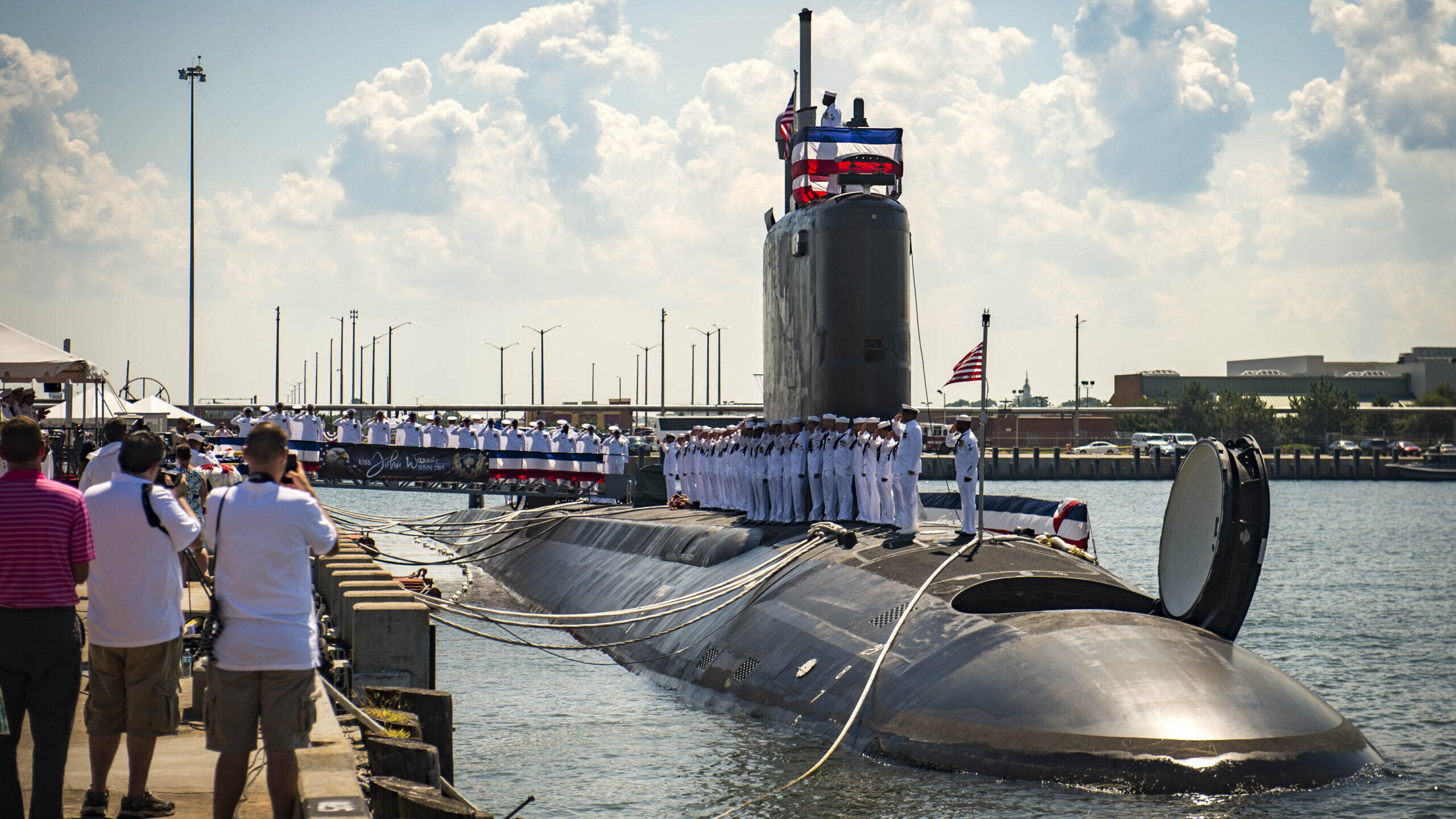
Virginia-class submarine USS John Warner at commissioning with the new Virginia Payload Module on display. (US Navy photo)
SYDNEY — China, eager to undermine the AUKUS plan for Australia to build a fleet of nuclear-powered attack submarines, claimed today that the arrangement poses “serious nuclear proliferation risks, undermines the international non-proliferation system, exacerbates [the] arms race and hurts peace and stability in the Asia-Pacific.”
Chinese Foreign Ministry spokesman Mao Ning told reporters that China urged “the US, the UK and Australia to abandon the Cold War mentality and zero-sum games, honor international obligations in good faith and do more things that are conducive to regional peace and stability.”
Details of the AUKUS arrangement are expected to be unveiled Monday by US President Joe Biden as well as British and Australian leaders at a ceremony in San Diego. But according to media reports, Australia is likely to get at least three Virginia-class nuclear attack submarines from the US to bridge the looming capability gap between its Collins-class submarine retirements and the arrival of the first Australian-built boats. The plan is later — after building up its nuclear expertise, creating new high-security shipyards and ports and training thousands of workers in technologies related to nuclear-powered submarines — for Australia to build its own boats based on Britain’s Submersible Ship Nuclear Replacement, its next generation sub still in the design phase.
Asked about the Chinese reaction during a visit to India, Australian Prime Minister Anthony Albanese said today both that his country would boost defense spending to help pay for the boats and would keep “investing in capability, as we should, but we’re also investing in relationships, as we are.” He said that’s what he’d been doing in India and “throughout the Indo-Pacific.” And he noted that under his Labor Party government Australia has “improved our relationship with China.”
His defense minister, Richard Marles, said in an interview today that the AUKUS plan to build the attack boats “is the biggest step forward in our military capability that we’ve had since the end of the Second World War. And this, more than anything that we can do, will allow us, in a pretty difficult world, to look after ourselves.”
OP ED: Fixing a fatal, nuclear flaw in AUKUS
Albanese had cover on his political flank, from both the opposition leader, Peter Dutton, and Andrew Hastie, the shadow minister for defense.
“This is one of those issues where there truly is bipartisan support. The public often say politicians fight too much or there are stances taken that are in the short-term interest,” Dutton said, appearing on the same TV program as Marles. “This is in the long-term interest of our country.”
Dutton’s stance might appear to be a shift from his criticism of the idea of buying a British boat, but the fact the first ones will be American and the rest will be British-designed but built bu Aussies — from a boat modified for and by Aussies — appears to have mollified him.
Hastie offered a broader and more detailed defense of the Australian effort.
“AUKUS is truly a nation-building exercise and that’s why it’s got to be beyond politics of the day. We’re certainly going to hold the government to account on things like timing and budgets, and the plan to deliver AUKUS, but we need to work together because this is nation-building,” the former captain of the Aussie SAS said in an interview with the Australian Broadcasting Corporation today.
RELATED: Pentagon official warns of communication breakdown with China
He acknowledged it’s going to be difficult, pointing to the need to recruit more submariners and more experts in the defense industry, not only for the boats but also for the other AUKUS initiatives. “We need to also get people who are specialists in quantum computing, artificial intelligence, and all the other capabilities that are part of pillar two of AUKUS. So, this is massive. It’s a big task and recruiting and retaining people is going to be a really important part of that going forward.”
In particular, Hastie said buying American Virginia-class subs makes sense “because first of all, we’ve got to respond to the strategic environment. That’s critical, absolutely critical.
“I think the prime minister in previous statements has said that there might be up to 10 submarines being built in Adelaide. So I think it’s win-win-win for us in preparing to face challenging strategic circumstances and a win for South Australia potentially, if we go ahead with the 10 submarines there.”
He conceded there is “risk in this project,” especially when Australia attempts to build its first sub. “First of class is a very difficult undertaking, particularly with submarines, probably the most complex military machine you can design and then build.” He argued that risk is part of the reason Australia might “do things in tandem — off the shelf purchase of Virginia class whilst we build up our own industrial capacity and build this joint submarine over the next decade and beyond.”
In keeping with the politics of his Liberal Party, Hastie pointed to China’s recent and vast military modernization. “Well, there’s one country in the region that’s undergone the biggest peacetime militarization since the Second World War and that’s the People’s Republic of China,” he said. “So they can make comments like they have, but it’s kind of ironic given what they’re doing with their military. We’re going to focus on our national interests and being a good partner to our regional neighbors.”








